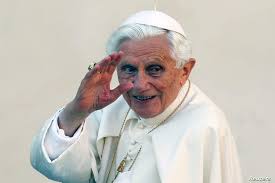Pope Emeritus Benedict XVI lashed out at Germany’s Catholic Church in published comments on Monday, perhaps signaling a new fight between the church’s conservative and liberal wings.
Pope Benedict, who stepped down in 2013 and adheres closely to traditional Church philosophies, has been critical at times of the Church in his native Germany, which tends to take a more liberal line.
For example, multiple German Catholic churches are breaking with Vatican guidelines by blessing gay marriages.
That has made him a controversial figure in Germany.
It also raised fears that, in retirement, Benedict was being egged on by conservative factions in the Church to counter the more liberal positions of the current pope, Francis, even if he has not gone as far as some German churches.
“As long as only the office, but not the heart and the spirit, speak in church official texts, the exodus from the world of faith will continue.”
This was in the comments due to be published in the next issue of the publication Herder Korrespondenz.
Born Joseph Ratzinger, the 94-year-old said he expected a real personal testimony of faith from the spokespersons of the Church.
The former pope said the institutions of the church, from hospitals to schools or the charity Caritas, that many people holding key posts did not share the church’s inner mission of the gospel.
According to him, there was a need to often obscure the testimony of this institution.
The pope emeritus argued that in the German Catholic Church, official texts were mainly written by people for whom the faith was only a routine.
“In this sense, I must admit that for a large part of official Church texts in Germany, the phrase ‘church routine’ does indeed apply.’’
Benedict also distanced himself from his choice of words in his famous “Freiburg Speech’’ when he called for the Catholic Church to become unworldly.
“History has shown that, when the Church becomes less worldly, her missionary witness shines more brightly,’’ he said during the 2011 address in Freiburg.
He said the Church should distance itself from its environment at the time, the message was taken to mean that the Church should not adapt to the modern world.
Looking back, Benedict told the Herder Korrespondenz he had not sufficiently expressed the positive aspects of his argument.
Benedict also said the Church was made up of wheat and chaff, good fish and bad fish.
So it could not be a matter of separating the good from the bad, but it could be a matter of separating the faithful from the unfaithful.

